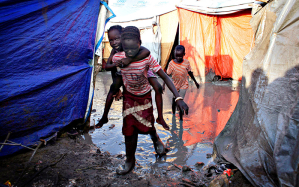
Before they became an independent country, the mostly Christian people of South Sudan lived under the Muslim-dominated government of Sudan. Now a prominent international broadcaster has taken a look at how the country has progressed since its people voted to be a separate country.
Singeli Agnew and Anjali Kamat of Al Jazeera America went to South Sudan to see how the United States helped create the world's newest country for the program, "Fault Lines." The hour-long show looks at how the country turned into another failed state.
"Thousands of people have been killed and almost two million displaced in a civil conflict that erupted in late 2013," Agnew and Kamat wrote. "'Fault Lines' investigates how a select group of U.S. politicians and advocates shepherded the nation into existence-and asks what responsibility they now bear for the political and humanitarian disaster unfolding there."
In a press release issued by Jocelyn Austin of Al Jazeera America, South Sudan managed to disintegrate into chaos four years after the country was born. That's because conflict broke out there in December 2013, forcing 2 million people to leave their homes and leading to the deaths of 50,000 people.
"We felt that if we could build up champions in Congress, that that would increase the odds of the United States becoming more deeply engaged and involved," former Clinton White House official John Prendergast said.
According to Austin, Kamat managed to interview members of the "Council," a group that sought to gain support in South Sudan's fight against the Islamist government in Khartoum. Their leader was John Garang, who halted his graduate studies in Iowa in the 1980s to take on the Sudanese government through the Sudan People's Liberation Army, known as SPLA.
"You could see the passion in [rebel leader] John Garang, about equality, independence, [and] democracy," Ted Dagne, former African affairs specialist at Congressional Research Service, said.
However, Alex de Waal, executive director of the World Peace Foundation at Tufts University, told Al Jazeera America that Garang was "ruthless" and "completely intolerant of dissent." He also focused on Garang's human rights record.
"In demonizing Khartoum, one of the side effects of that was to promote the SPLA as heroes and as angels," de Waal said. "They were neither of those things. The human rights record of the SPLA throughout the entire war has at no time been any better than the human rights record of the Sudan government."
According to Al Jazeera America, evangelical Christians took up interest in the region after finding out that Muslims held Christians as slaves in the region. The broadcaster argued that development galvanized support in the U.S., which the SPLA exploited.
"John Eibner, CEO of Christian Solidarity International-USA, made dozens of trips to Sudan to negotiate with alleged slave traders, even as some SPLA commanders reportedly exploited the Christian missionaries by rounding up local children in exchange for money," Austin wrote.
Despite millions in international aid and billions of dollars in oil profits, Al Jazeera America reported that South Sudan leadership was "one of the most corrupt regimes in the world." Lam Akol of the SPLM-Democratic Change Party confirmed that assessment.
"Schools could have been built, medical centers could have been built, roads could [have] been built, but none of this happened," Akol said. "Because the money was embezzled, the corruption ate away everything."
Akol added that the current conflict in South Sudan is "a war over power, and has no justification whatsoever." De Waal had even harsher criticism for that country's government.
"The leadership of South Sudan got accustomed to being indulged, to being treated with kid gloves and even to getting away with murder," de Waal said.
"South Sudan: Country of Dreams" will air on Al Jazeera America's "Fault Lines" at 10 p.m. ET/7 p.m. PT on Monday. Online viewers can stream the documentary off Al-Jazeera America's website after it first airs on its channel.






